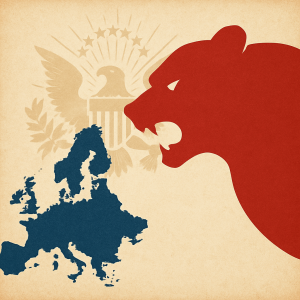Mario Macron or Emmanuel Draghi, you call them as you wish, they can call themselves as they wish, but these two must urgently stand together and adopt a common programme because, now that it has been won, the battle begins.
The battle for European unity has just been won where it had begun in 1957, in Rome, where Matteo Salvini’s Lega entered a government whose chairman, Mario Draghi, wants to move towards a Union that is “increasingly integrated” and is equipped with a “common public budget”.
Head put in a noose and wearing a penitent’s habit, Matteo Salvini converted to the federalist ambition after the Rassemblement national of Marine Le Pen also stopped talking about getting out of the “prison of the people” that the European Union constituted in her eyes. So, there is no longer any large group left in the Europe of 27 to challenge the march towards European unity, and that’s not all.
At the same time, the United States has just accepted an invitation from the Union to join in the resuming talks with Iran on the nuclear question. It is as if we were anticipating what could be tomorrow’s new alliance of democracies, in which the Union would be at the forefront in its African and Middle Eastern marches, while the United States would confirm its Asian priority.
The Union, for the first time, stepped up on Thursday as an actor on the international scene, and this just after Emmanuel Macron and Angela Merkel have committed themselves to push forward the projects of European tanks and fighter planes. Although Joe Biden reaffirmed the United States’ commitment to defending the old continent, the idea of a common European defence continues to make progress. The concept of “strategic autonomy” is becoming indispensable. Nobody in Europe, not one country, not one party would refuse the benefits of the common recovery plan and, for better or worse but certainly better than if it had done nothing, the Union has taken the fight against the pandemic into its own hands, even though the treaties do not give it competence in the field of health.
Yes, everything says today that the battle has been won, but why is it only just beginning?
It’s because everything around us is moving very fast.
China is in a hurry to multiply the faits accomplis in the South China Sea and in Hong Kong. China is consolidating its position of strength, while the United States is going to inject 1900 billion dollars into its economy, at a time when we Europeans do not expect to release a single cent of our recovery plan for several months, even though we know that it should be doubled. A social and political crisis can erupt before the effects of the common recovery are felt, and, however quickly we have moved forward, we are moving much more slowly than we should.
Because we may stall or even hit the ground, we must speed up, we must shake up the most reluctant, and above all, we must not wait until Germany finds itself a new political majority and a new Chancellor next September.
For that to happen, the two leaders of the Union who share the most audacity and the strongest European ambitions must call for general mobilisation without further delay. Together, Mario Draghi and Emmanuel Macron must work on a proposal for Europe which, in the vein of the New Deal, combines broad collective investment with new social protection measures – those which in this instance are required to tackle the growing job insecurity.
This is what Joe Biden is preparing to experiment with in the United States. This is what Mario Macron and Emmanuel Draghi must push forward together, but it is up to Italy to take the lead, because it would be counterproductive for France to seem to distance itself from Germany by opposing it with an Italian-French front. It is up to the Union’s former central banker, the man who saved the euro in 2008, to put on the table the first elements of a new plan for Europe that France could then help to enrich. This plan would be ready the day after the German elections. Germany would have already had time to get used to it and other Member States would have had time to sign up to it.



